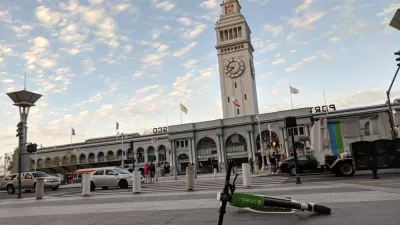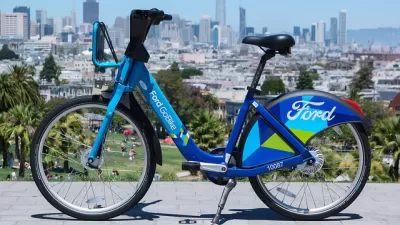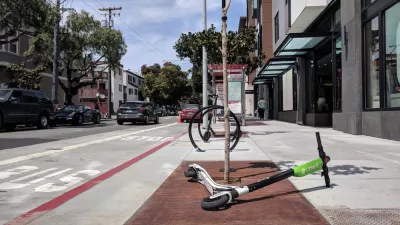Public bikeshare arrived in San Diego in 2014. Last month, three companies unleashed thousands of dockless bikes, cluttering sidewalks in three business districts to the chagrin of merchants who want a time-out so the city can develop regulations.
Discover ® Bike, operating in partnership with the city of San Diego, was the first to offer bikeshare in California's second largest city, with docking stations opening on October 30, 2014. Customers knew where to find bikes and where to drop them off. Life was orderly in the bikeshare business.
Then came dockless bikeshare companies LimeBike and Ofo on February 15. A week later, Mobike arrived. Santa Monica-based Bird, maker of electric (stand-up) scooters, beat them all, arriving in mid-January.
[San Diego Union-Tribune video and news article: "Is Southern California's 'dockless' electric scooter fad a public safety hazard? Mark Platte and environment reporter Joshua Emerson Smith discuss the abundance of 'dockless' bikes and electric scooters in San Diego." March 6.]
"Merchant groups from the Gaslamp to Mission Hills and La Jolla have expressed frustration with the dockless bikes since thousands of them began arriving...," reports David Garrick for the San Diego Union-Tribune on March 8.
They are complaining that bikes are strewn about the sidewalks of high-traffic business districts and that community leaders got no notice the flood of bikes was coming, depriving them of a chance to weigh in on possible regulations.
"We completely understand the concept of a dockless system, however there needs to be more control and order in communities that are highly congested and have high pedestrian usage,” said Chris Gomez, manager of the Little Italy Association.
The new bikeshare operators have supporters in the environmental community who welcome the new bikes, seeing them as alternatives to motor vehicles.
“They have become an overnight sensation,” said Nicole Capretz, executive director of Climate Action Campaign. “It has changed everything about how people view our transportation future.”
Origins of the problem
"San Diego’s dockless bike experience has been more of a free-for-all than in most cities, because San Diego couldn’t make an exclusive deal with one operator without violating a previous exclusive deal with a rental company that requires bikes to be returned to docking stations," explains Garrick.
Five hundred miles to the north, San Francisco officials had earlier found themselves in a similar situation. They, as well as four other Bay Area cities, had entered into an exclusive contract with Ford GoBike, administered by Brooklyn-based Motivate, which took over the docking bikeshare operation known as Bay Area Bike Share, operated by the regional air district, in late June 2017.
Worried about an influx of China-based Bluegogo bikes flooding city sidewalks, the San Francisco Municipal Transporation Authority considered issuing a permit to JUMP Bikes, a dockless electric bicycle sharing outfit operated by Social Bicycles that differs from the aforementioned private dockless operations in that the bikes are not "self-locking." They need to be locked to bike racks or other objects like street poles if not available.
However, the permit created legal tension between the city and Motivate that led to the intervention of the Metropolitan Transportation Commission. The permit was issued in January, reported Kathleen Pender for the San Francisco Chronicle on Jan. 17.
LimeBike, one of five other companies that applied to operate stationless bike-sharing in the city, is livid that the San Francisco Municipal Transportation Agency shut out other competitors for 18 months without telling them a single vendor would be chosen.
Back to San Diego: Regulations Requested
"Gomez and the Little Italy Association are lobbying Civic San Diego, which oversees policies for downtown, to request a cease-and-desist action until the City Council can study the problem and approve a comprehensive set of regulations," adds Garrick.
In the absence of any local laws specific to such bikes, San Diego officials are trying to crack down on irresponsible behavior by sending the city’s operators seven pages of rules this week that apply to all local businesses.
For example, merchants can't occupy sidewalks unless permitted, and yet bikeshare bikes are doing just that. And when bikes are left in public parks and beaches, they are breaking another law, "advertising goods for rent in parks or at beaches without express permission from the city."
Gomez suggested that bike corrals be placed in the business districts which could act like bike stations without locking docks.
In a somewhat related story last summer, civic and business groups, upset with the Ford GoBikes' expansion of docking stations in San Francisco's Mission District, called for a moratorium on additional docking stations.
"Bikeshare control?"
Finally, Planetizen posted last month that the Florida legislature had taken action on local bikeshare regulations in an effort to help municipalities.
The bill would bring uniformity to the implementation of dockless bikeshare around the state. "It would remove the need for municipal employees to conduct extensive research on best practices for liability, safety and land use, among other things,"...
On March 1, HB 1033 cleared the House on a 114 – 0 vote, but was "[i]ndefinitely postponed and withdrawn from consideration" by the Senate on March 10."
FULL STORY: Frustrated merchants want temporary dockless bike ban so San Diego can create rules

Planetizen Federal Action Tracker
A weekly monitor of how Trump’s orders and actions are impacting planners and planning in America.

Map: Where Senate Republicans Want to Sell Your Public Lands
For public land advocates, the Senate Republicans’ proposal to sell millions of acres of public land in the West is “the biggest fight of their careers.”

Restaurant Patios Were a Pandemic Win — Why Were They so Hard to Keep?
Social distancing requirements and changes in travel patterns prompted cities to pilot new uses for street and sidewalk space. Then it got complicated.

Platform Pilsner: Vancouver Transit Agency Releases... a Beer?
TransLink will receive a portion of every sale of the four-pack.

Toronto Weighs Cheaper Transit, Parking Hikes for Major Events
Special event rates would take effect during large festivals, sports games and concerts to ‘discourage driving, manage congestion and free up space for transit.”

Berlin to Consider Car-Free Zone Larger Than Manhattan
The area bound by the 22-mile Ringbahn would still allow 12 uses of a private automobile per year per person, and several other exemptions.
Urban Design for Planners 1: Software Tools
This six-course series explores essential urban design concepts using open source software and equips planners with the tools they need to participate fully in the urban design process.
Planning for Universal Design
Learn the tools for implementing Universal Design in planning regulations.
Heyer Gruel & Associates PA
JM Goldson LLC
Custer County Colorado
City of Camden Redevelopment Agency
City of Astoria
Transportation Research & Education Center (TREC) at Portland State University
Camden Redevelopment Agency
City of Claremont
Municipality of Princeton (NJ)





























